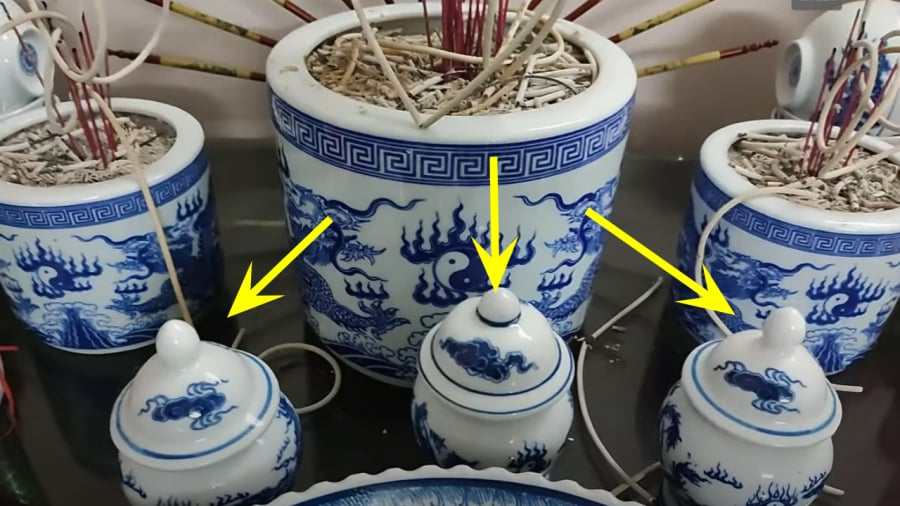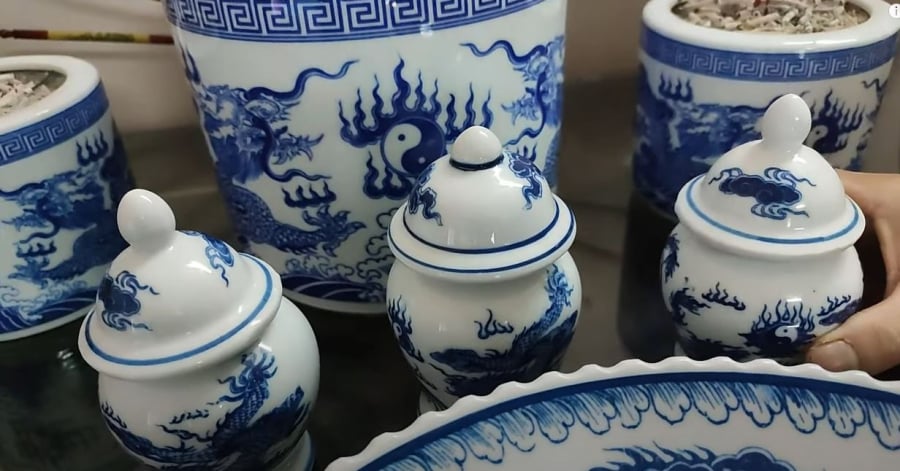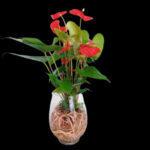The placement and arrangement of objects on an altar hold significant meaning. Apart from the incense burner, flower vase, ceremonial tray, and either a photo or statue of the deity or ancestor being worshipped, a family may choose to include additional items. However, it is essential to maintain a neat and balanced layout as a sign of reverence and respect for the divine and ancestral spirits.
Why place three jars of rice, salt, and water on the altar?
Rice, salt, and water are essential to human life, and their presence on the altar symbolizes both reverence to the deities and ancestors and a wish for abundance and prosperity. Each of these items holds a unique significance and represents distinct aspirations.

According to Feng Shui principles, each jar of rice, salt, and water on the altar has its own specific meaning.
– The Significance of the Salt Jar
In ancient beliefs, salt played a crucial role. It is indispensable in daily life and serves as an important condiment in every meal. In the spiritual realm, salt is believed to ward off negative energy and dispel malevolent spirits. Additionally, the act of “buying salt at the beginning of the year” is considered auspicious, inviting happiness, prosperity, and good fortune for the coming year.
– The Significance of the Rice Jar
Rice is a staple food in the East Asian diet, and its grains are often likened to heavenly pearls. Placing a jar of rice on the altar signifies a desire for abundance, indicating a wish for a life of plenty, free from want or scarcity.
– The Significance of the Water Jar
Water is essential to life and is the source of all existence in the universe. In Feng Shui, the water jar represents purity and spiritual clarity. It is also a symbol of immense power and strength. Thus, placing a water jar on the altar conveys a desire for purity of mind and heart, as well as a wish for robust health and abundant wealth, akin to the relentless flow of water.
The presence of these three jars on the altar demonstrates the family’s reverence for the divine and their ancestors, as well as their aspirations for a life filled with happiness, prosperity, and fulfillment.
How to Arrange the Three Jars of Rice, Salt, and Water on the Altar
According to Feng Shui principles, the jars can be arranged in a straight line or in a triangular formation, with the water jar in the center and the rice jars on either side.
The arrangement can be adapted to fit the size and type of altar. For smaller altars, consider reducing the number of jars to maintain a harmonious and balanced setting. For an altar dedicated to Buddha, a single jar of clean water symbolizing purity is sufficient.
On an ancestral altar, it is customary to place all three jars—rice, salt, and water—in front of the incense burner and behind the offering of five types of fruit. These jars should be arranged in a straight line, with a gap of approximately 5-8 cm between them. If space is limited, you may opt to place only the salt and rice jars, omitting the water jar.

On the ancestral altar, the jars of rice, salt, and water are placed in a straight line in front of the incense burner.
For an altar dedicated to the God of Wealth, place the rice, salt, and water jars in a triangular formation behind the incense burner, situated between the statues of the God of Wealth and the Earth God.
The size of the jars should be proportionate to the altar’s dimensions. Ensure that the contents of the jars—water, rice, and salt—are clean and free from impurities. It is recommended to replace the contents of the jars every two to three weeks or once a month.
The rice and salt from the jars can be consumed after being replaced. However, instead of emptying the entire contents, consider replacing only half and refilling the rest with fresh rice, salt, or water.
This information is for reference only and is subject to individual interpretation.
“Attract Good Fortune and Welcome Wealth: Plant This Aquatic Plant on the First Day of the New Year at the Wealth God’s Altar”
Aquatic plants are a perfect addition to any altar, especially those dedicated to the God of Wealth. Their vibrant presence not only enhances the aesthetic appeal but also brings good fortune and prosperity to the household. These plants create a serene and auspicious ambiance, fostering a positive environment for wealth accumulation and inviting blessings of abundance.





































